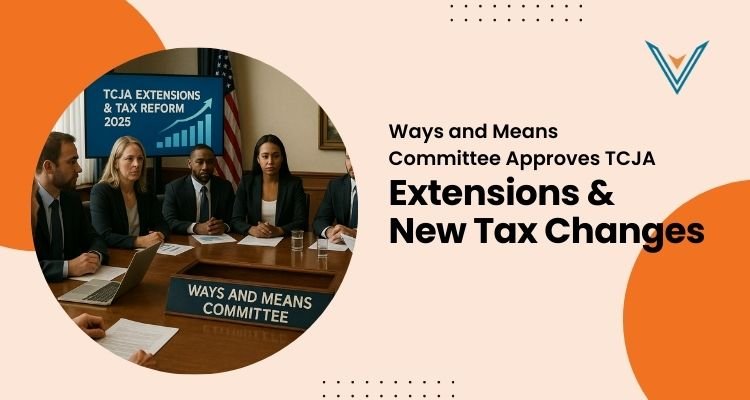The House Ways and Means Committee has approved a comprehensive tax bill extending many provisions of the 2017 Tax Cuts and Jobs Act (TCJA) while introducing significant new tax changes. After working through the night, the committee voted to approve the 389-page bill with no amendments. The legislation now moves to the House Budget Committee for inclusion in a larger budget reconciliation package, with an estimated fiscal impact of $3.819 trillion for 2025-2034.
Key Changes for Individuals
Tax Rates and Deductions
- Permanent TCJA Tax Rates: The current seven-bracket structure (10% to 37%) would be made permanent with modified inflation adjustments.
Projected 2026 Income Tax Brackets for Single Individuals:
| Rate | On income of |
|---|---|
| 10% | Up to $12,375 |
| 12% | Over $12,375 but not over $50,275 |
| 22% | Over $50,275 but not over $107,200 |
| 24% | Over $107,200 but not over $204,700 |
| 32% | Over $204,700 but not over $259,925 |
| 35% | Over $259,925 but not over $639,275 |
| 37% | Over $639,275 |
Source: Joint Committee on Taxation
- Standard Deduction Increases: From 2025-2028, married couples filing jointly would see a $2,000 increase, heads of household would get a $1,500 increase, and other filers would receive a $1,000 increase.
- Child Tax Credit: Would increase to $2,500 for 2025-2028, then revert to $2,000 with inflation adjustments. The $1,400 refundable portion would be made permanent.
New Tax-Free Income Opportunities
- No Tax on Tips: A new above-the-line deduction (Sec. 224) would eliminate income tax on qualified tips for service workers through 2028. This applies to cash tips in occupations that customarily received tips before December 31, 2024.
- No Tax on Overtime: A similar deduction (Sec. 225) for overtime pay would apply to compensation required under the Fair Labor Standards Act. Highly compensated employees would not be eligible.
- Senior Bonus Deduction: A new $4,000 deduction for taxpayers age 65 and older (phasing out for AGI over $75,000 single/$150,000 joint) would be available from 2025-2028.
SALT Deduction Changes
- New $30,000 Cap Structure: The $10,000 state and local tax deduction cap would be replaced with a higher $30,000 limit for “specified taxes,” which would phase down for taxpayers with modified AGI over $400,000 (but not below $10,000).
- Passthrough Entity Tax Limitations: The bill would curtail the use of passthrough entity taxes (PTETs) to circumvent SALT limitations. The AICPA has criticized these changes as “unfair” to small businesses, including accounting firms, medical offices, and Main Street businesses.
New Car Loan Interest Deduction
- A temporary exclusion (2025-2028) for qualified passenger vehicle loan interest from the personal interest disallowance would be created.
- Interest on loans for vehicles with final assembly in the United States would qualify.
- The exclusion is capped at $10,000 per year and phases out for taxpayers with modified AGI over $100,000 single/$200,000 joint.
Education Benefits
- 529 Plan Expansions: The bill would allow 529 plans to be used for elementary, secondary, and homeschool expenses, treating them as qualified higher education expenses.
- Employer Student Loan Payments: The exclusion allowing employers to provide up to $5,250 in tax-free educational assistance (including student loan repayment) would be made permanent and indexed for inflation after 2026.
- Student Loan Forgiveness: The exclusion from income for student loans discharged due to death or disability would be made permanent with adjustments.
Estate Tax and Charitable Giving
- Increased Estate Tax Exemption: Basic estate and gift tax exemption would increase to $15 million (indexed for inflation).
- Charitable Deduction for Non-itemizers: For 2025-2028, individuals taking the standard deduction could claim up to $150 ($300 for joint returns) for charitable contributions.
New MAGA Savings Accounts
- Money Accounts for Growth and Advancement: New tax-preferred accounts for children under age 8, with contributions allowed until age 18 (limited to $5,000 per year, adjusted for inflation).
- Distribution Rules: No distributions permitted until the beneficiary reaches age 18. Between ages 18-25, distributions are limited to half the account value as of age 18.
- Qualified Uses: Distributions for higher education, credentialing, small business loans, or first-time home purchases would be subject to capital gains tax. Other distributions face income tax plus 10% penalty before age 30.
- Government Pilot Program: A $1,000 credit would be deposited into MAGA accounts for every U.S. citizen born between 2025-2028.
Important Changes for Businesses
Tax Deductions and Depreciation
- Qualified Business Income Deduction: Would increase from 20% to 23% and be made permanent, with adjusted threshold and phase-in amounts.
- Bonus Depreciation: 100% bonus depreciation would be extended through 2029 (2030 for longer-production-period property).
- Section 179 Expensing: Maximum amount would increase to $2.5 million with a $4 million phaseout threshold.
- R&D Expenses: The requirement to capitalize and amortize R&D expenses would be suspended for domestic research from 2025-2029.
- Interest Deduction Limitations: The calculation would revert to the more favorable EBITDA method for 2025-2029.
Business Tax Credits
- Employer-Provided Child Care Credit: Would increase from 25% to 40% of qualified childcare expenditures (50% for eligible small businesses) with a higher $500,000 credit limit ($600,000 for small businesses).
- Paid Family and Medical Leave Credit: Would be made permanent (currently set to expire after this year).
Reporting Requirements
- Third-Party Network Transactions: The Form 1099-K reporting threshold would return to $20,000 and 200 transactions (instead of the scheduled $600 threshold).
- 1099 Information Reporting: General 1099 reporting threshold would increase to $2,000 (from $600) and be indexed for inflation after 2026. This change will reduce paperwork for small businesses, gig workers, and independent contractors.
International Tax Provisions
- FDII and GILTI: The scheduled reductions in the FDII deduction (from 37.5% to 21.875%) and the GILTI inclusion deduction (from 50% to 37.5%) would be repealed.
- BEAT Tax: The scheduled increase from 10% to 12.5% would be eliminated.
Health Care Provisions
- CHOICE Arrangements: The bill would codify employer-offered individual coverage health reimbursement arrangements (renamed as Custom Health Option and Individual Care Expense arrangements).
- HSA Eligibility: Individuals enrolled only in Medicare Part A would remain eligible to contribute to Health Savings Accounts.
Clean Energy Provisions
The bill would terminate or phase out numerous clean energy tax credits earlier than previously scheduled, including:
- Electric vehicle credits (ending after 2025/2026 instead of 2032)
- Energy-efficient home improvement credits (ending after 2025)
- Clean electricity production and investment credits (phased out)
- Carbon oxide sequestration credits (restricted)
What This Means for You
These potential tax changes could significantly impact your financial planning. Individual clients should consider strategies around tips, overtime, car purchases, charitable giving, and education funding. Business owners need to evaluate impacts on business structure, equipment purchases, and R&D investments.
Our team at Virtue CPAs is closely monitoring these developments and will provide updates as the legislation progresses.
Don’t navigate these complex tax changes alone!
SCHEDULE A TAX CONSULTATION TODAY or call us at (678) 952-9001
Let our tax experts help you understand how these proposed changes might affect your specific situation and identify proactive strategies to maximize your tax savings.



